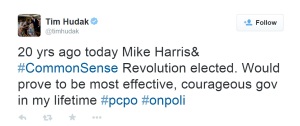ninetytwopointeight@gmail.com
Today marks 20 years since the Progressive Conservative Party foisted its so-called "Common Sense Revolution" on Ontario.
Former PC Ontario leader Tim Hudak took to Twitter this morning to extol the virtues of this full-throated neoliberal experiment, declaring it "the most effective, courageous gov[ernment]" in his lifetime.

Some remember those days differently. Here are a few highlights of the "Common Sense Revolution" (1995-99) and the subsequent "Blue Print" era (1999-2003).
- The death of Dudley George/Ipperwash Crisis
- The death of Kimberly Rogers
- The Walkerton water disaster
- A double-digit cut to social assistance rates
- Punitive “workfare”
- Unnecessary tax cuts
- Criminalizing poverty via the "Safe Streets Act"
- The 1997 teacher/student walkout
- Demonstrations against poverty held at Queen's Park
- Health spending cuts
- Eliminating rent control
- The dented cans of tuna fiasco
- The fiscal nightmare that is the Toronto megacity
- The privatization of, and subsequent gouging by, Hwy. 407
- Cancelling Toronto transit projects
- The repealing of proxy comparisons for pay equity (reinstated by court challenge)
- The repealing of employment equity legislation
- The Magna budget and contempt for the legislature
This is not a day to celebrate.


